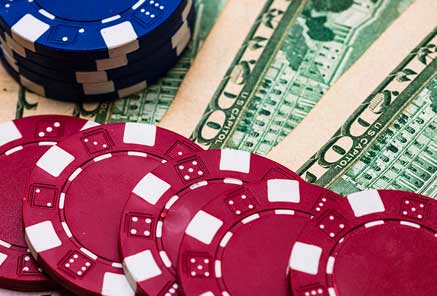For centuries, certain religions have preached against the evils of gambling. They claim that gambling leads to addiction and the squandering of needed resources that would otherwise be used to take care of one’s family. They claim that gambling addiction disproportionately impacts the working poor and ultimately leads to the breakdown of the family. For decades gambling was completely illegal in Virginia and many other U.S. States.
Overtime, Virginia, and other states have incrementally allowed gambling to creep back into polite society. No longer is the General Assembly concerned over the moral hazards of gambling. Currently, there are three groups vying to reap the substantial profits of Virginia’s gambling industry. In 1987, the Virginia Assembly determined that gambling was a moral hazard, and therefore illegal, unless the Commonwealth profited from it. The Virginia Lottery sold its first ticket in 1988. Commercial gambling remained illegal for everyone except the State for nearly three decades; the Commonwealth successfully fought off all competition, thus protecting their monopolistic cash cow.
Over the last several years so-called Skill Games have been popping up all over Virginia. It is estimated that there are over 10,000 Skill Games in the Commonwealth. A Skill Game looks and feels like a slot machine but inserts a minor element of skill into the gameplay. Operators of Skill Games claim that the introduction of this element of skill into gameplay means it is not really gambling. This “loop-hole” allowed Skill Game operators to install thousands of these machines across the Commonwealth. The legality of Skill Games was hotly contested. The Virginia Lottery reported that it lost 140 million dollars to its only competitor, the operators of Skill Games.
In 2020 the Virginia Assembly passed House Bill 4, which allowed for Casinos to be built in the Commonwealth. Five cities, including Richmond, Portsmouth, Norfolk, Danville, and Bristol have already been approved to operate casinos. Of course, casinos in Virginia will be heavily regulated by the Virginia Lottery Board, and Virginia will reap millions of dollars in tax revenues.
In the spring of 2020, the General Assembly passed House Bill 896 which amended the Virginia Code to allow Virginians to participate in sports betting. Virginia is only the ninth state to allow sports betting. The sports betting will be done primarily online, rather than from brick-and-mortar locations.
It is surely only a coincidence that one year after Casinos and sports betting are permitted in the Commonwealth that the Virginia Assembly amends the Virginia Code to prohibit the controversial Skill Machines that divert millions from the state coffers. Virginia Code section 18.2-325 was amended to add:
“Illegal gambling’ also means the playing or offering for play any skill game.”
This law, unless enforcement is postponed, is scheduled to go into effect on July 1, 2021. Thousands of Virginians who work for Skill Game operators will likely lose their jobs as a result of this law.
Virginia Code section 18.2-326, states, in part:
“Except as otherwise provided in this article, any person who illegally gambles or engages in interstate gambling . . . shall be guilty of a Class 3 misdemeanor. If an association or pool of persons illegally gamble, each person therein shall be guilty of illegal gambling . . . However, if any person makes, places, or receives any bet or wager of money or other thing of value on a horse race in the Commonwealth . . . other than (i) at a racetrack licensed by the Virginia Racing Commission . . . or (ii) at a satellite facility or through advance deposit account wagering . . . licensed by the Virginia Racing . . . such person shall be guilty of a Class 1 misdemeanor.”
So, in Virginia it is a Class 3 Misdemeanor to participate in illegal gambling, UNLESS you are gambling on horses in a way that does not profit the Commonwealth, then the crime of gambling increases to a Class 1 Misdemeanor. Clearly, the Virginia Assembly has determined that gambling is a more heinous crime if the State is not profiting from it.
While the General Assembly diligently toils over which citizens will become extravagantly wealthy (or at least which ones will not) by being afforded the rare privilege of operating gambling facilities, you may wonder if you are permitted to legally gamble in your own home. Virginia Code section 18.2-334. Exceptions to article; private residences, states, in part:
“Nothing in this article shall be construed to make it illegal to participate in a game of chance conducted in a private residence, provided such residence is not commonly used for such games of chance and there is no operator as defined in subsection 4 of 18.2-325.”
So, you can have your friends over for a nice, friendly game of poker so long as you do not charge them a fee or take a rake. A rake is usually a percentage commission the operator takes from the pot, or bets made.
Typically, the game’s operator will take between 2 to 20 percent of the total bets. So, if the players cumulatively bet $200.00 on a hand of poker, then the operator may take a cut of $10 -$40, called a rake. This practice is illegal in Virginia, unless you are operating a casino that has been licensed by the State.
Gambling has changed a lot over the decades in Virginia. The proponents of State sponsored gambling claim that it raises money for the State to pay for all kinds of valuable services like education; they also claim that casinos bring good jobs. Those that oppose gambling claim that it is addictive and disproportionately harms poor, working-class people by enticing them to give their rent and grocery money to the large corporations that operate casinos. Also, opponents of gambling claim that it may attract unsavory characters causing the crime rates to increase around casinos. I am sure that there is some element of truth to the arguments on both sides.


